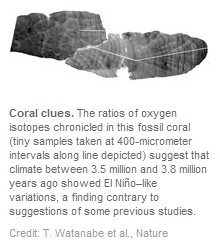| News & Events |
| Location:Home > News & Events > Science and Technology News |
| A Warmer Climate May Not Mean El Ni?o Comes to Stay |
A warm period in Earth's past thought to be a possible analog to Earth's climate future wasn't stuck in a permanent El Niño, a new study suggests. Today's El Niños, which cause weather havoc by triggering floods in some regions and droughts in others, are characterized by warmer-than-normal sea-surface temperatures in the tropical Pacific. Things were steamy back in the middle of the Pliocene epoch, which lasted from 2.8 million to 5.3 million years ago. Global temperatures back then averaged between 2°C and 3°C warmer than today. According to many climate models, that's where we're heading—Earth's temperature, they say, will reach those heights before the end of this century. So scientists often look to this so-called Pliocene warm period for hints about our future climate. At least one study, which used ocean-floor sediment samples to infer sea-surface temperatures in the tropical Pacific during the mid-Pliocene, suggests that the temperature difference between the eastern and western Pacific was much lower than it normally is today, a sign that the climate may have been stuck in a state that resembles today's El Niño. But a new study in the 10 March issue of Nature suggests otherwise. Geochemist Tsuyoshi Watanabe of Hokkaido University in Sapporo, Japan, and his colleagues hunted for climate clues in corals that grew in the Philippines during the mid-Pliocene. They looked at how the ratios of oxygen isotopes locked in the corals' carbonate skeletons varied month by month as the colonies grew. Those ratios provide clues about the temperature and salinity of the water in which the corals were immersed, Watanabe says. The new study is the first to provide a window into the way the Pliocene climate varied from year to year, says paleoclimatologist David Lea of the University of California, Santa Barbara. Sediment cores, which formed the basis of the earlier studies, generally provide only a low-resolution look at climate over the long term, he notes, but corals chronicle their ever-changing environmental conditions in growth bands like tree rings, giving a high-resolution picture over short intervals. Besides finding season-to-season variations in oxygen isotopes, Watanabe and his colleagues discerned year-to-year variations. They found signs that in some years the waters were warmer or saltier than others, due to increased evaporation or reduced precipitation. During the 35-year interval chronicled in each fossil coral, variations in oxygen isotope ratios followed a 3½-year cycle. Today, El Niños occur every 3 to 7 years on average, says Watanabe. Whatever caused the ancient fluctuations in isotope ratios, the researchers contend, those variations are a sign that climate back then varied from year to year just as it does today. The team's findings are "pretty convincing evidence" that there were El Niño-type, year-to-year climate variations during the Pliocene, says isotopic geochemist Brad Linsley of the University at Albany, State University of New York. The variations in isotopic ratios take place on the right time scale, and they mirror those seen in modern corals, he notes. Paleoclimatologist Ana Christina Ravelo of the University of California, Santa Cruz, agrees. "This is a really important result," she says, that provides "intriguing evidence of a possible El Niño-like variability from an era much warmer than now." Although computer models suggest that average climate conditions in the future will be much like today's El Niño, the climate at that time isn't stuck in one state year after year, she says: "They're all over the place with variability." by Sid Perkins
|
| Appendix Download |
|
|
